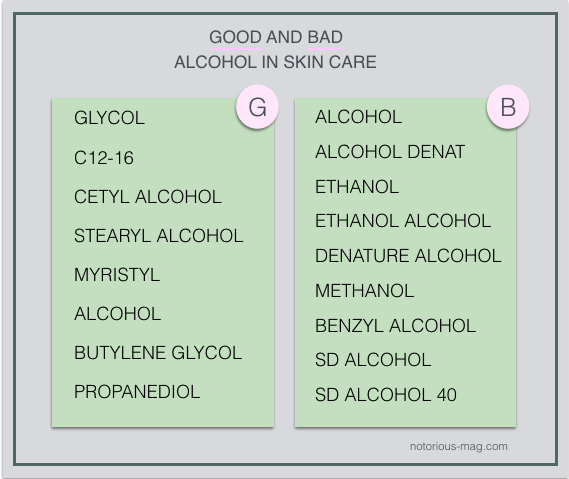Did you know that like cholesterol, there is good alcohol in skincare products and bad alcohol?
We usually think of alcohol as something that is bad for your skin, because it can cause irritation and dryness – hence wrinkles! But depending on which type of alcohol and its position on the ingredients list, it can actually be beneficial for your skin.
Alcohol can be used in cosmetics for germ-killing, for emulsifying and for better absorption of the product. It is usually very damaging, leaving your skin extremely dry, stripping your skin of its natural protection and causing wrinkles and acne. So before you buy your next beauty product, make sure you pay attention to the following points:
How to Interpret an Ingredient List
You probably don’t know this, but in cosmetic formulations, the ingredients appear on the list in order, from the most concentrated to the least ones. In other words, if the alcohol on your cosmetic appears on the bottom part of the ingredients list, it means its concentration is very little, but if it appears from the middle to the top of the list, the concentration is stronger and may be harmful to your skin.

What is Bad Alcohol in Skincare?
As we already said, simple alcohol can irritate and leave your skin very dry. So you should avoid products containing: Alcohol – Alcohol Denat – Benzyl Alcohol – Denatured Alcohol – Ethanol Alcohol – Ethanol – Isopropyl Alcohol – Methanol – SD Alcohol – SD Alcohol 40
What is Good Alcohol in Skincare?
Butylene Glycol and Propanediol are alcohols that moisturize your skin. Fatty Alcohols from natural oils such as coconut and palm oil, help hydrate your skin thanks to the fatty acids they contain. Unless you have very sensitive skin, these are the Alcohols that are beneficial for your skin: C12-16 – Cetearyl Alcohol – Cetyl Alcohol – Glycol – Lauryl Alcohol – Myristyl Alcohol – Stearyl Alcohol
Maybe you want to read how to wash your face accurately!
Photo via Shutterstock
